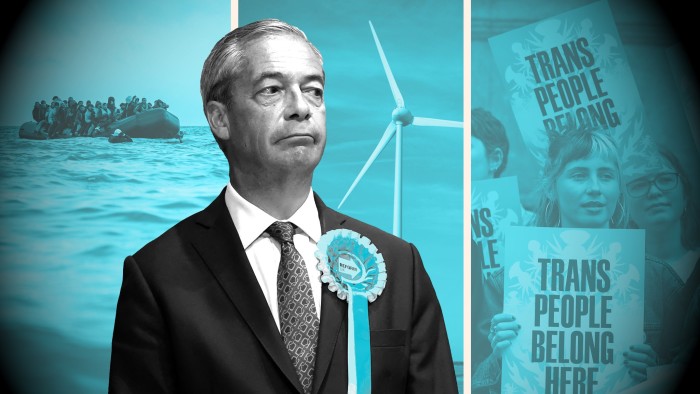Unlock the Editor’s Digest for free
Roula Khalaf, Editor of the FT, selects her favourite stories in this weekly newsletter.
After Reform UK took control of a string of councils at last week’s English local elections, closer attention is being paid to the rightwing populist party’s policy platform.
There will be intense scrutiny over the coming months of what Nigel Farage’s insurgent outfit has promised, both at national level and in the areas where it will now be overseeing council services.
What are Reform’s key national policies?
At last summer’s general election, Reform campaigned hard on an anti-“woke”, anti-net zero and anti-immigration agenda.
Its manifesto promised to stop “small boats” of illegal immigrants crossing the English Channel, including by leaving the European Court of Human Rights.
It pledged to detain and process illegal immigrants offshore, if necessary, to ban foreign students from bringing dependants to the UK, impose a five-year residency requirement for access to public services and to freeze all other “non-essential” immigration.
Reform also promised to deport foreign-born criminals at the end of their jail terms and to withdraw citizenship status from immigrants who commit all but the lowest-level crimes.
The pro-Brexit party also said it would scrap the remaining EU laws that apply to the UK and halve foreign aid.
It presented a largely small-state agenda, promising to take more than a million SMEs out of corporation tax and to raise the VAT turnover threshold from £90,000 to £150,000 in order to “free up small entrepreneurs from red tape”. Farage has also said that inheritance tax should be completely scrapped.
Reform has promised to make hiring and firing easier and its MPs voted against the Labour government’s legislation aimed at strengthening workers’ rights.
Farage has called for the NHS funding model to be “re-examined”, although last year’s Reform manifesto committed to a health service that was free at the point of use.
However ahead of last week’s local elections, in which it was targeting Labour areas as well as Conservative ones, Reform began to present more traditionally left-wing economic policies.
Farage backed the nationalisation of both British Steel’s ailing Scunthorpe plant and failing water companies, as well as striking bin workers in Birmingham.
But the party remains vociferously anti-net zero.
In last year’s manifesto Reform warned net zero policies were “crippling the economy”, promised to scrap green energy subsidies, grant fracking licenses and begin fast-track North Sea licences for gas and oil.
What is Reform promising to do locally?
Reform now controls 10 councils and several billion pounds in expenditure on local services including social care, road maintenance and libraries.
Two Reform metro mayors were also elected — for Greater Lincolnshire and Hull and East Yorkshire — with limited devolved powers over transport, skills and wider economic development.
Across all those campaigns the party promised a Doge-style crackdown on waste, mirroring Elon Musk’s war on government spending in the US.
Darren Grimes, a prominent Leave campaign figure during the 2016 Brexit referendum and now a Durham county councillor, said the party would send auditors into local authorities in order to purge waste.
The party has cited expenditure it classes as wasteful — such as on ergonomic chairs — across a number of English councils. Reform also promised to scrap Diversity, Equality and Inclusion (DEI) initiatives and reduce local authority commitment to the net zero agenda.
It has promised to block the housing of asylum seekers in hotels in the areas it controls.
Reform had initially promised to ban all but national flags from being flown from its town halls, although a swift backlash in several places led to clarification that regional flags, such as Lancashire’s red rose, would be allowed.
In Greater Lincolnshire, new mayor Andrea Jenkyns has promised to work with the Labour government on its “new towns” housebuilding programme.
How achievable are Reform’s local policies?
English local government has been in the throes of financial crisis for years, with budgets increasingly taken up by rising social care costs.
Reform may identify totemic examples of expenditure it deems to be wasteful, said local government expert Professor Tony Travers, but council budgets had little room for manoeuvre.
“The difficulty they’re going to find is most counties spend 60, 70, 80 per cent on social care for children and adults,” he said. “It is not being spent on woke lanyards.”
Farage warned local DEI officials to seek “alternative careers” in the aftermath of his party’s victories last week. But this work is often wrapped up in other roles, while in some cases it is mandated by national legislation, such as the Equalities Act 2010.
The party has yet to outline exactly how it would prevent the housing of asylum seekers by the Home Office, over which councils have historically had no control.
Reform’s chair Zia Yusuf has promised to “use every instrument of power available” to block such placements, including through the courts, although previous legal challenges by councils have had mixed results.
In 2022, Conservative-led Stoke council failed to secure an injunction on the use of a hotel for asylum seeker accommodation on planning grounds.




